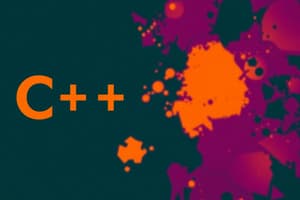Podcast
Questions and Answers
What is the purpose of a variable in C++ programming?
What is the purpose of a variable in C++ programming?
- To control program flow
- To hold and store data (correct)
- To perform operations on data
- To declare functions
Which of the following is a valid rule for naming variables in C++?
Which of the following is a valid rule for naming variables in C++?
- Variable names should be in all uppercase
- Variable names must begin with a number
- Variable names can only consist of alphabets, numbers, and _ (correct)
- Variable names can contain special characters like @, #, $
What happens to local variables in C++?
What happens to local variables in C++?
- Their scope is limited to the block or method they are declared in (correct)
- They are accessible anywhere in the program
- They persist throughout the entire program
- They can be accessed by other programs
How are variables declared in C++?
How are variables declared in C++?
When declaring a variable in C++, why is it a preferred practice to begin variable names with a lowercase character?
When declaring a variable in C++, why is it a preferred practice to begin variable names with a lowercase character?
What is the scope of instance variables in C++?
What is the scope of instance variables in C++?
What is a common characteristic of static variables in C++?
What is a common characteristic of static variables in C++?
What is the purpose of a function in C++?
What is the purpose of a function in C++?
What does the following function declaration do: int add(int a, int b);
What does the following function declaration do: int add(int a, int b);
What is the difference between a local function and a global function in C++?
What is the difference between a local function and a global function in C++?
Flashcards are hidden until you start studying
Study Notes
C++ Variables and Functions
In C++ programming, variables and functions are fundamental concepts used to store data and perform operations on that data, respectively. Let's explore these two topics in detail.
Variables
A variable is a container that holds data. It is a named location in memory where data can be stored and accessed. Each variable should be given a unique name, called an identifier, to indicate its storage area. For example, int age = 14; is an integer variable named age with a value of 14.
There are rules for naming a variable:
- A variable name can only have alphabets, numbers, and the underscore
_. - A variable name cannot begin with a number.
- It is a preferred practice to begin variable names with a lowercase character.
Declaring and Initializing Variables
To declare a variable, you use the following syntax:
datatype variable_name;
For example, int a; declares an integer variable named a.
You can also initialize a variable when declaring it:
datatype variable_name = initial_value;
For example, int a = 10; declares an integer variable named a with an initial value of 10.
Scope of Variables
A variable's scope determines where it can be accessed in the program. In C++, there are three types of variables:
- Local Variables: Declared within a block or method, their scope is limited to the block in which they are declared. They are created when the block is entered and destroyed when the block is exited.
- Instance Variables: Declared in a class outside any method or constructor, their scope is the entire class. They are created when an object of the class is created and destroyed when the object is destroyed.
- Static Variables: Similar to instance variables, but declared using the
statickeyword. Their scope is the entire class, and their values are shared among all objects of the class.
Functions
Functions are blocks of code that perform a specific task. They can be called from other parts of the program to execute their code. Functions can take input in the form of parameters and can return output in the form of a return value.
Declaring Functions
To declare a function, you use the following syntax:
return_type function_name(parameter_list);
For example, int add(int a, int b) declares a function named add that takes two integer parameters a and b, and returns an integer value.
Defining Functions
To define a function, you provide the implementation of the function's code. For example, int add(int a, int b) { return a + b; } defines the add function to return the sum of two integers.
Calling Functions
To call a function, you use its name followed by parentheses containing the arguments, if any. For example, sum = add(a, b); calls the add function with a and b as arguments and assigns the return value to the sum variable.
Function Scope
A function's scope is the area of the program where it is valid. A local function is valid only within the block where it is declared, while a global function can be called from anywhere in the program.
By understanding these fundamental concepts in C++ programming, you can effectively use variables and functions to build complex and efficient programs.
Studying That Suits You
Use AI to generate personalized quizzes and flashcards to suit your learning preferences.




